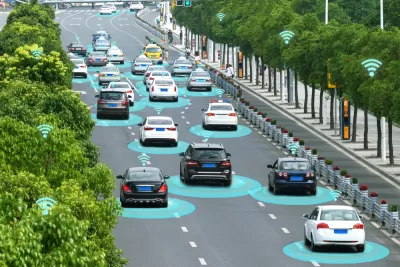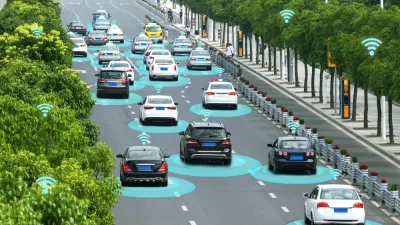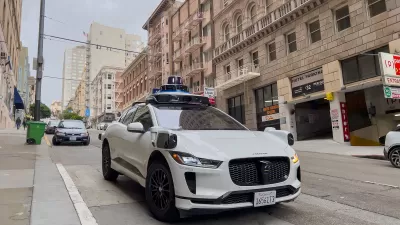A study about planning for AVs shows that most cities are not actively working to prepare for them and officials are worried about the many potential effects they will have on cities.

A new article in the Journal of the American Planning Association takes a closer look at how cities are preparing for autonomous vehicles. MIT researchers reviewed plans from the 25 largest U.S. cities and surveyed transportation and planning officials in 120 cities across the country.
The findings show that few cities have started preparing for AVs. "Only a tiny fraction of survey respondents said that their town had a 'clear plan' for autonomous vehicles, and just 36 percent of the largest cities have general plans that mention AVs. Even fewer, 24 percent, have issued separate strategies for maximizing the possible safety and congestion-easing benefits of self-driving cars," reports Laura Bliss.
Most cities report that they are waiting on federal or state legislation to come through and larger, more populated cities are more likely to be prepared. And while officials are looking to the benefits of AVs on roads, a third of respondents are also concerned about the potential negative impacts of the vehicles, including increases in vehicle miles traveled and sprawl and decreases in transit ridership and local revenues.
FULL STORY: Why Aren’t Cities Getting Ready for Autonomous Vehicles?

Alabama: Trump Terminates Settlements for Black Communities Harmed By Raw Sewage
Trump deemed the landmark civil rights agreement “illegal DEI and environmental justice policy.”

Planetizen Federal Action Tracker
A weekly monitor of how Trump’s orders and actions are impacting planners and planning in America.

The 120 Year Old Tiny Home Villages That Sheltered San Francisco’s Earthquake Refugees
More than a century ago, San Francisco mobilized to house thousands of residents displaced by the 1906 earthquake. Could their strategy offer a model for the present?

In Both Crashes and Crime, Public Transportation is Far Safer than Driving
Contrary to popular assumptions, public transportation has far lower crash and crime rates than automobile travel. For safer communities, improve and encourage transit travel.

Report: Zoning Reforms Should Complement Nashville’s Ambitious Transit Plan
Without reform, restrictive zoning codes will limit the impact of the city’s planned transit expansion and could exclude some of the residents who depend on transit the most.

Judge Orders Release of Frozen IRA, IIJA Funding
The decision is a victory for environmental groups who charged that freezing funds for critical infrastructure and disaster response programs caused “real and irreparable harm” to communities.
Urban Design for Planners 1: Software Tools
This six-course series explores essential urban design concepts using open source software and equips planners with the tools they need to participate fully in the urban design process.
Planning for Universal Design
Learn the tools for implementing Universal Design in planning regulations.
Clanton & Associates, Inc.
Jessamine County Fiscal Court
Institute for Housing and Urban Development Studies (IHS)
City of Grandview
Harvard GSD Executive Education
Toledo-Lucas County Plan Commissions
Salt Lake City
NYU Wagner Graduate School of Public Service




























